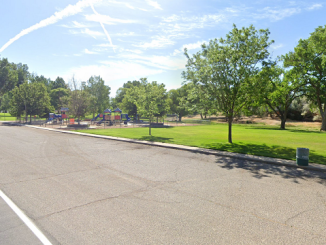
Attorneys for “Rust” movie armorer Hannah Gutierrez Reed – convicted of involuntary manslaughter in the 2021 on-set fatal shooting of a cinematographer – have filed a motion for a new trial or to have her case thrown out after the related case against actor Alec Baldwin was dismissed in dramatic fashion last week.
The attorneys filed the motion Tuesday in Santa Fe First Judicial District Court, citing “egregious prosecutorial misconduct” and multiple allegations of “severe and ongoing discovery violations by the state.”
Gutierrez Reed’s attorneys ask the court to order her prison release and to remove Kari Morrissey as the case’s special prosecutor “for the misconduct that has been found, and the violations committed in Ms. Gutierrez Reed’s case.”
On Friday, the involuntary manslaughter case against Baldwin – who authorities said held the prop gun that fired the shot that killed cinematographer Halyna Hutchins in October 2021 – was dismissed after the judge overseeing the case ruled prosecutors did not properly turn over evidence to the defense. Legal experts had said the collapse of the actor’s case could result in Gutierrez Reed being freed from the New Mexico state prison, where she’s serving an 18-month sentence following her March conviction.
In Tuesday’s filing, Gutierrez Reed’s attorneys argue that her case should be thrown out or retried in part because of judge’s determination of withheld evidence in Baldwin’s case; what they assert was Morrissey lying in court about the evidence on Friday; and what they say were other instances of suppressed evidence in the armorer’s case.
CNN has sought comment from Morrissey.
The shooting, and defense attorneys’ allegations
The shooting happened October 21, 2021. Baldwin was on the set at a ranch outside Santa Fe practicing a “cross draw” with a prop gun – pulling it from a holster on the opposite side of his body from his draw hand – when it fired a live round, killing Hutchins and injuring director Joel Souza.
As the armorer, Gutierrez Reed was responsible for firearm safety and storage. At her trial, prosecutors argued she repeatedly violated safety protocol and acted without caution in performing her duties, ultimately leading to Hutchins’ death. Gutierrez Reed’s defense attorney argued she has been scapegoated for the safety failures of film set management and other crew members.
The evidence that imploded Baldwin’s trial came to light last week, when a crime scene technician testified that a man had delivered a box of ammunition to the Santa Fe County Sheriff’s Office in March right after Gutierrez Reed’s conviction. The man, Troy Teske, a retired police officer and friend of the armorer’s father, told investigators he obtained the ammunition from prop supplier Seth Kenney, and believed the ammunition could be associated with the “Rust” incident, the technician testified.
However, the technician testified the items were catalogued separately from Baldwin’s case and were not included in the “Rust” case inventory or tested to see if they matched the lethal round.
Baldwin’s attorneys, in a filing last week asking for the case to be dismissed, claimed that this could point to “an external source of the live ammunition (prop supplier Seth Kenney)” on set. The Baldwin team’s filing alleged prosecutors didn’t disclose the evidence because it “would be favorable to Baldwin,” last week’s filing shows.
Baldwin was unaware of the risk live ammunition had been brought to the “Rust” set, and for prosecutors to establish a link between Baldwin and the live ammunition source, they would have to show Gutierrez Reed, the armorer, had brought the rounds to set, according to the motion filed last week. “Evidence that the live rounds came from Kenney is therefore favorable to Baldwin, which is why the state buried it,” last week’s document states.
During a chaotic, hourslong hearing Friday, investigators testified they and Morrissey determined the ammo was not relevant to the “Rust” case and so did not turn it over to the defense. Morrissey also testified, saying investigators had determined the ammunition was not a match to those found on the “Rust” set and had no evidentiary value. The lead investigator, however, testified the rounds looked “similar” to the dummy rounds on the film’s set.
Judge Mary Marlowe Sommer ruled prosecutors did not properly turn over evidence to the defense. She dismissed Baldwin’s case with prejudice, meaning it cannot be brought again.
In Tuesday’s filing, Gutierrez Reed’s attorneys said prosecutors – and even Gutierrez Reed’s defense team itself – was aware of the ammunition Teske had before he gave it to the sheriff’s office in March. Her attorneys wrote an email to Morrissey in January saying it was “important to compare the powder of the Teske rounds to the powder in the powder in the live rounds found on the Rust set,” Tuesday’s filing reads.
Morrissey wrote back that she didn’t plan to retrieve or test the rounds, because she found them visually dissimilar and not relevant, Gutierrez Reed’s attorneys said in Tuesday’s filing.
But on Friday during Baldwin’s trial, Morrissey claimed that Gutierrez Reed’s attorneys did not want rounds that Teske had because they incriminated their client, Tuesday’s filing reads.
“That is an absolute falsehood. … Far from distancing (themselves) from the Teske rounds, defense counsel recognized their potential exculpatory value had the state tested them,” the court filing said.
Teske had turned the rounds over to the sheriff’s office in March, hoping that it would test the rounds “while Gutierrez Reed pursued her appeal,” Tuesday’s filing says.
“Instead, the state placed them in a separate case file and attempted to hide them,” Gutierrez Reed’s attorneys wrote in Tuesday’s filing.
In Tuesday’s court filing, the attorneys claimed an interview with Kenney, the prop supplier, was suppressed – and that the attorneys would have used his statements in cross examination in Gutierrez Reed’s trial had they known about them. In that interview, Kenney spoke about her experience and had not heard allegations that she was unsafe, among other things, the attorneys wrote.
A report conducted by state firearms experts was likewise not made available to Gutierrez Reed’s attorneys, and the state revealed it to Baldwin’s defense team only after Gutierrez Reed was convicted, Tuesday’s filing says. The report said the gun used on the “Rust” set had “unexplained toolmarks on critical surfaces of the trigger and sear,” Tuesday’s filing says.
Gutierrez Reed’s attorneys previously made that argument in a separate court filing, which Reuters reported on last month, asking that a court release her from prison. The firearms experts’ finding is evidence that the gun could have accidentally fired and could have led to her not being found guilty in the case, Gutierrez Reed’s attorney Jason Bowles said last month, according to Reuters.
Gutierrez Reed’s defense team “has also become aware of another possible 900 or so pages of material” related to state’s witnesses that was disclosed to Baldwin’s attorneys shortly before his trial, but not to Gutierrez Reed’s attorneys, Tuesday’s filing reads.
Her lawyers were “still reviewing these at the time of the filing of this motion,” the filing reads.
The state violated Gutierrez Reed’s due process rights because it failed to disclose evidence, her attorneys wrote in Tuesday’s filing.
“This court stated on July 12 that the integrity of the judicial system demanded that the court dismiss Mr. Baldwin’s case with prejudice,” the filing said. “How can it be any different with Ms. Gutierrez Reed’s case, with this proven litany of serious discovery abuses?”
“The intentional withholding of crucial evidence … by the state has compromised the integrity of the entire judicial process,” the filing continued.
Gutierrez Reed previously filed an appeal of her conviction in May.
Source: cnn.com CNN’s Dalia Faheid contributed to this story.






Be the first to comment